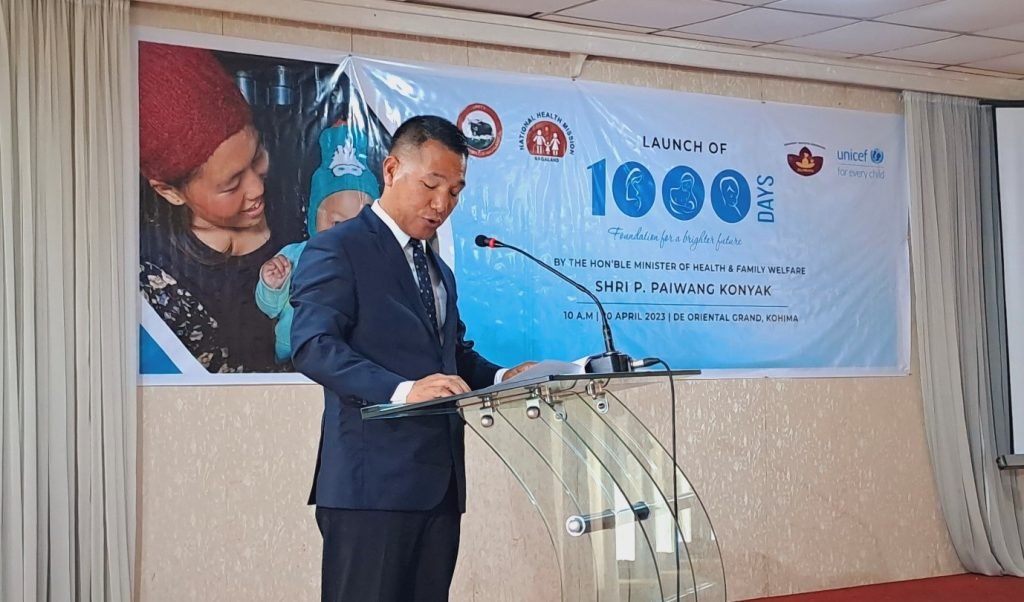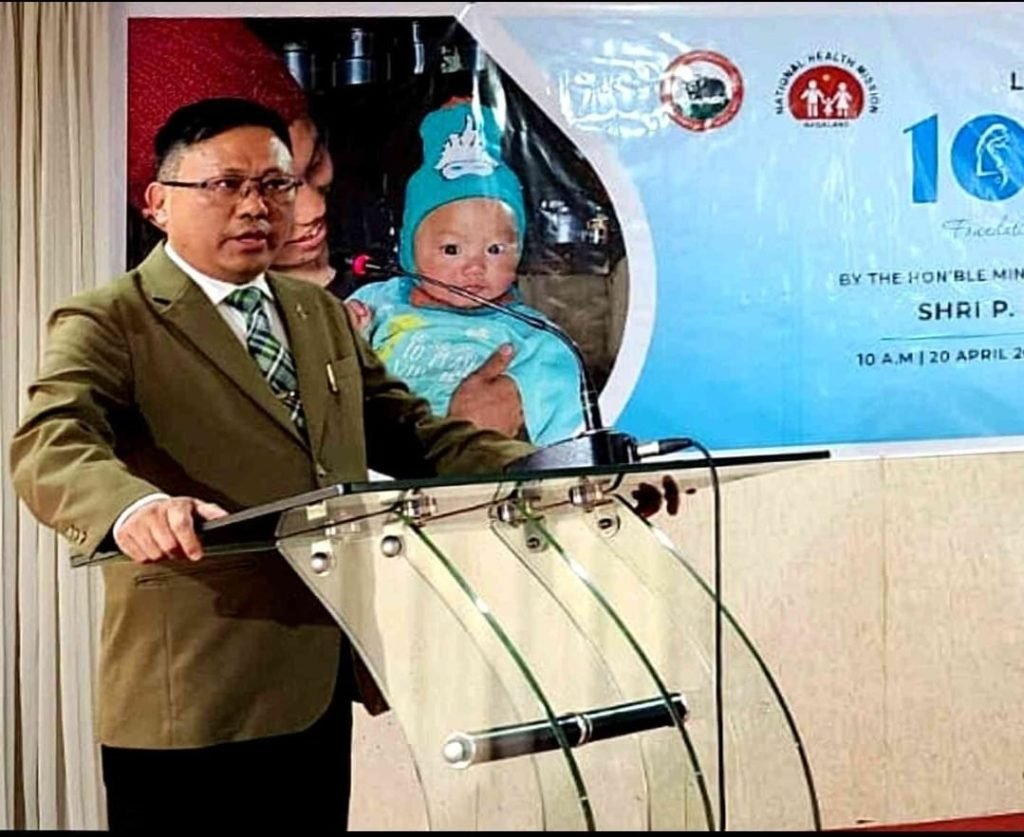Minister of Health & Family Welfare P. Paiwang Konyak launched the First 1000 Days, Foundation for a Brighter Future on Thursday here at De Oriental Grand Hotel, Kohima. The ‘First 1,000 Days’ refers to a child’s life from the moment they are conceived until they reach 2 years of age (24 months). The first 1000 days are a period of rapid physical growth and accelerated mental development and offers a unique opportunity to build lifelong health and intelligence. This is a time when the child’s brain, body and immune system grow and develop significantly.
Launching the First 1000 Days, Minister P. Paiwang Konyak said that proper intervention during these 1000 days starting from pregnancy will have a major impact on the overall survival and quality of a child’s life.
He emphasised that it is expected of parents and families to have good knowledge about the First 1000 Days of a child’s life and utilize this knowledge for the betterment of the child’s future.
This knowledge will also guide the parents about good child-upbringing practices which will improve the thinking and stimulate the brain development of a child and thereby help it reach its full potential. The period of 1000 days lays the skills of a child’s future as maximum brain growth, physical development and other cognitive skills develop during this period, said Konyak.
He urged that parents, to avail full advantage of the facilities and services available in the Government Health Facility Centres and also during the village Health and Nutrition Days for the healthy growth of a child.

H&FW Minister, P. Paiwang Konyak addressing the gathering during the launch of the First 1000 Days on 20 April 2023.
The H&FW Minister stressed on the need to ensure that each child receives the health and nutrition services for the overall development and that the message of good health for a healthy future can be passed on to every community with the active support of the civil societies, churches, students bodies, partner NGOs and friends from the media.
Konyak encouraged all the District Health Officers led by the Chief Medical Officer to be committed to this noble cause to ensure that all the services must reach to the last villages of Nagaland.
He informed that H&FW department is on a pilot project on “Birth Waiting Home” at Mon and Kiphire districts. The project is to encourage institutional delivery under the care of skilled health providers and for the safety of the mother and child and to reduce morbidity and mortality, he said.
Meanwhile, with regard to the blood storage facilities, he said the blood storage facilities in 13 districts that are non-functional at the moment, will be activated at the soonest possible time to ensure that no mother dies of excessive bleeding or for want of blood during delivery. Adding that the three blood banks in Kohima, Dimapur and Mokokchung must have blood available at all times. Towards this, he said that the intensive blood donation awareness campaign will be held and urged citizens to come forward and donate blood to save the lives of many.
Konyak also informed that Nagaland’s immunization percentage stands only at 58% even as it was supposed to be 75% for hilly terrain state like Nagaland to avail additional funds for the health providers.
Mentioning the challenges faced by the ASHA (Accredited Social Health Activist) workers he appealed to the women societies, churches, civil societies and village councils to come out and assist the ASHA workers to ensure the targeted beneficiaries are reached since the ice-packed box carrying vaccines have to be administered within 24 hours.
Konyak asserted that investing in early childhood development could be the most secure public investment to get the best returns and attain the full potential of our children.
With the launch of the journey of the First 1000 Days, he appealed to the citizens to make an honest commitment to ensure that children get all the possible support especially in these first 1000 days for a brighter future.
Download Nagaland Tribune app on Google Play

Y. Kikheto Sema, IAS, Commissioner & Secretary, H&FW in his brief address asserted that the 1,000 days are the most critical time for positive impact on a child’s cognitive and physical development.
Sema pointed out that Nagaland has the lowest coverage of Antenatal Care (ANC), institutional delivery, and vaccination in the country and some of the reasons for the low coverage include, traditional beliefs/customs that there is no need for delivery in a hospital or an ANC check-up or vaccines; lack of awareness of its importance; geographical barriers – distance to facility; road conditions; economic barriers; and lack of trust in health system.

Y. Kikheto Sema, IAS, Commissioner & Secretary, H&FW at the launch of the First 1000 Days on 20 April 2023.
Stressing on the way forward convergence, he said that health is a collective responsibility, and revival of ‘Communitisation’ is the need of the hour. Adding that, the Church and civil society organisations can be the agents of change.
Further, Sema said the foundation for optimum health, growth and neuro-development across the lifespan is determined during the first 1000 days and is a massive opportunity to shape a child’s future.
Sema also said quality ANC, hospital delivery, breast feeding, full vaccination, nutrition for children and mother, and early childhood development are the essential interventions in the first 1000 days.
Dr. Longri Kichu, United Nations International Children’s Emergency Fund (UNICEF) said the period of pregnancy and two years of a child’s life makes 1000 Days. Stating that this is a critical period where 80% of the child’s brain development takes place, he encouraged the gathering to intervene during this crucial period to help children grow to full potential and said, “there’s no rocket science here these are the things we can do”.
Highlighting on the importance of vaccination in children Dr. Sheila Longkumer, Consultant, World Health Organisation (WHO) said, immunisation has been going on since 1980s and it is essential to keep children safe from different diseases. Sheila lamented that many people take diseases like measles for granted but it can lead to death and added that a lot of programmes are in the pipeline.
State Program Officer Reproductive Child Health, Dr. Khelito Zhimomi said that the State has 1355 villages registered but the department covers more than 1600 villages monthly for ‘Health, Sanitation and Nutrition Day’ which is held in all villages. “We do growth monitoring, screening of elderly people and children for malnutrition and send them to nearest unit for treatment,” he added.
Download Nagaland Tribune app on Google Play

Nagaland State Rural Livelihood Mission (NSRLM), Rural Development also highlighted on the Social and Behaviour Change Communications (SBCC) through Self Help Groups (SHGs) institution while the Department of Social Welfare highlighted on the schemes, services and nutritional support provided by the department through Anganwadi services for mothers and children during the first 1000 Days.
Meanwhile, Consultant Paediatrician, Naga Hospital Authority Kohima (NHAK), Dr Rüütuo-ü Sorhie highlighted about the importance and advantages of breastfeeding, while Dr Supongmeren, Gynaecologist, District Hospital Mokokchung stressed on the significance of Antenatal care and the risk it involves. He also encouraged the delivery at institutions to avoid complications.

